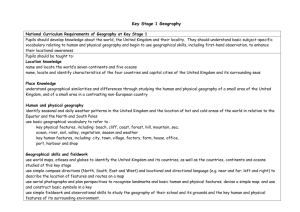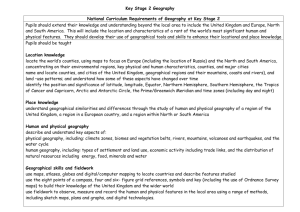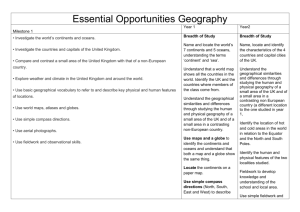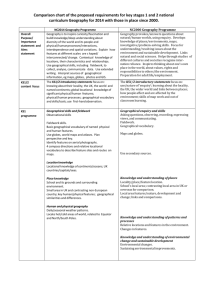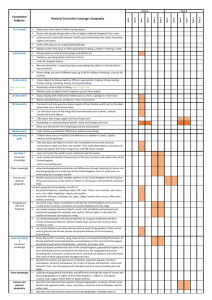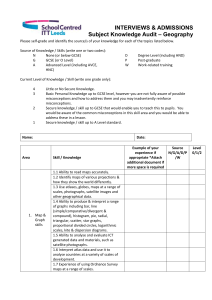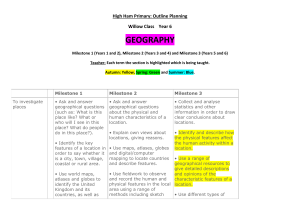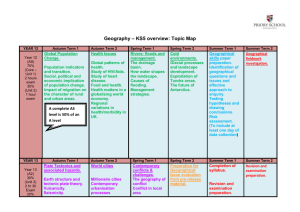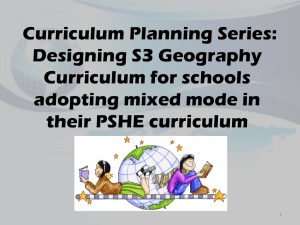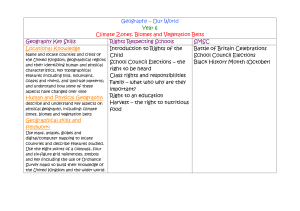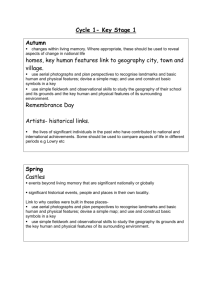Geography Policy
advertisement
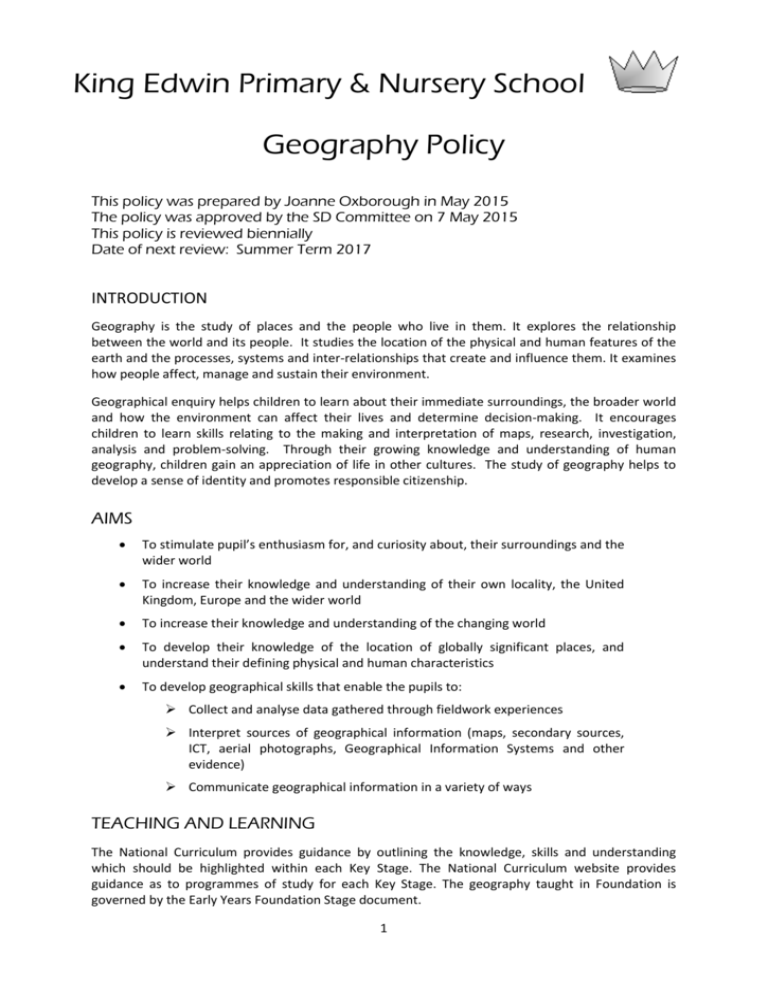
King Edwin Primary & Nursery School Geography Policy This policy was prepared by Joanne Oxborough in May 2015 The policy was approved by the SD Committee on 7 May 2015 This policy is reviewed biennially Date of next review: Summer Term 2017 INTRODUCTION Geography is the study of places and the people who live in them. It explores the relationship between the world and its people. It studies the location of the physical and human features of the earth and the processes, systems and inter-relationships that create and influence them. It examines how people affect, manage and sustain their environment. Geographical enquiry helps children to learn about their immediate surroundings, the broader world and how the environment can affect their lives and determine decision-making. It encourages children to learn skills relating to the making and interpretation of maps, research, investigation, analysis and problem-solving. Through their growing knowledge and understanding of human geography, children gain an appreciation of life in other cultures. The study of geography helps to develop a sense of identity and promotes responsible citizenship. AIMS To stimulate pupil’s enthusiasm for, and curiosity about, their surroundings and the wider world To increase their knowledge and understanding of their own locality, the United Kingdom, Europe and the wider world To increase their knowledge and understanding of the changing world To develop their knowledge of the location of globally significant places, and understand their defining physical and human characteristics To develop geographical skills that enable the pupils to: Collect and analyse data gathered through fieldwork experiences Interpret sources of geographical information (maps, secondary sources, ICT, aerial photographs, Geographical Information Systems and other evidence) Communicate geographical information in a variety of ways TEACHING AND LEARNING The National Curriculum provides guidance by outlining the knowledge, skills and understanding which should be highlighted within each Key Stage. The National Curriculum website provides guidance as to programmes of study for each Key Stage. The geography taught in Foundation is governed by the Early Years Foundation Stage document. 1 The use of a variety of enriching teaching approaches and of resources is encouraged through: Teacher presentations, role play and storytelling Question and answer sessions, discussions and debates about topical issues Individual and group research and presentations Pre and post learning tasks Photographs, pictures, maps, atlases and globes Topic boxes for each area of the geography curriculum ICT – interactive whiteboard and internet resources, DVD, Video, TV and other visual and audio resources Fieldwork, visitors and visits to places of geographical interest, especially in the local area The recognition of special events Emphasis is placed on the development of enquiring skills and empathy, as well as on factual knowledge. Using the challenge curriculum principles, a creative approach is encouraged for the teaching of geography. Geography will be taught through a themed topic making links with other areas of the curriculum. The prime learning challenge, expressed as a question, will be the starting point for all learning. A series of subsidiary challenges (questions) will then be planned to focus learning and extend children’s thinking. Children will undertake pre-learning tasks to assess their knowledge prior to learning and to aid teacher’s planning. At the end of each topic the children will undertake a post-learning task to assess what they have learned. ASSESSMENT During curriculum planning, clear learning objectives are set and opportunities for assessment are identified. Assessments are recorded in line with school policy. Assessment of children’s knowledge progress will then feed into planning for subsequent lessons. By the end of Foundation Stage, most children will be expected to: Know about similarities and differences between their own and other communities Talk about features of their own immediate environment and how this may differ to other environments By the end of Key Stage 1, most children will be expected to: Name and locate the continents and oceans of the world, the countries that make up the United Kingdom and their capital cities and surrounding seas Describe the main features of contrasting localities and recognise their similarities and differences Understand seasonal weather patterns for the United Kingdom, and be able to locate hot and cold areas of the world Use basic geographical vocabulary to describe human and physical features Be able to use basic geographical skills such as using maps to locate different countries, using compass directions and locational language, using aerial maps to study human and physical features and be able to devise their own maps, and use fieldwork and observational skills to study their surroundings 2 By the end of Key Stage 2, most children will be expected to: Locate the world’s countries, counties and cities of the United Kingdom and identify the different geographical lines of the earth, time zones, hemispheres and circles Understand geographical similarities and differences of contrasting localities in the UK, Europe and North or South America Describe and understand key aspects of human and physical geography Be able to use geographical skills such as using maps, atlases, globes and digital mapping to locate countries, use the 8 points of a compass and 4 and 6 figure grid references and use fieldwork and observational skills to investigate, analyse and present their findings in a variety of ways EQUAL OPPORTUNITIES We will ensure that all children who attend King Edwin Primary and Nursery School will be given the same opportunity to develop their knowledge, skills and understanding of Geography; regardless of their ethnic or cultural background, physical or other disability. We will also seek to make children aware of how a lack of opportunity can impact on the lives of others. For example: Geographical fieldwork will be arranged so that it will be accessible to all children When other places are studied, similarities between our lives and those of other peoples will be highlighted and negative or purely stereotypical or exotic images will be challenged When other groups are studied, children will be made aware of underlying inequalities in power, influence, benefits and advantages, both physical and economic HEALTH AND SAFETY Fieldwork and site visits are an important part of work in geography and school health and safety guidelines will be adhered to at all times. Risk assessments will be made when appropriate. ROLE AND RESPONSIBILITES It is the role of the Geography co-ordinator, under the guidance of the Headteacher: To organise Geography within the curriculum and to ensure progression and development To assist with and monitor planning and quality of delivery within the curriculum. To keep abreast of developments within Geography and carry out INSET when required To monitor and update resources and draw up a budget 3

